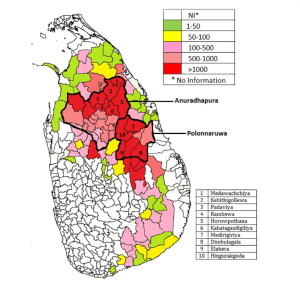What is CKD?
Chronic Kidney Disease or CKD causes your kidneys to be damaged preventing them from performing their primary function of filtering your blood. All waste compounds and excess fluids are retained within the body. Retaining such material can cause other health conditions like strokes or heart disease.
If CDK is left untreated it can lead to complete kidney failure and heart disease. While CKD in its early stages is asymptomatic (meaning it doesn’t present symptoms). People with a higher risk of CKD are;
- Diabetes
- High blood pressure
- Heart disease
- Family history of CKD
- Obesity
Though some tests such as
- Serum creatinine
- UFR (urine full report)
can help detect the disease.
Why is CKD Rural Sri Lanka’s Hidden Killer?
In recent years experts have identified a geographical correlation to the diagnosis of CKD in Sri Lanka. With 15.1% and 22.9% in the Sri Lankan districts of Anuradhapura, Polonnaruwa.

Rural farming communities in Sri Lanka are facing a hidden threat- Chronic Kidney Disease (CKD). Find out why it’s so prevalent in these areas, the risk factors, and what can be done to prevent it.
This is mainly in association with rural farming communities especially those that practise Chena cultivation, this is a traditional farming method that practises selecting a small area of jungle, and burning the natural vegetation. When the central and southern provinces were studied, the number of CKD cases recorded was significantly less than those in rural agricultural communities in the north-central dry zone areas of the country making up 50% of the burden of tertiary nephrology treatment facilities in the affected areas. Most CKD patients are men between the ages of 40 to 69 years of age in farming communities in rural Sri Lanka. Most sufferers of the disease are in close proximity to irrigation canals or source their potable water below the water table.
Studies have shown that one of the main causative factors for the epidemic in rural Sri Lanka is the proximity of drinking water sources in close proximity to agricultural irrigation channels developed for agriculture with demonstrable seepage from the irrigation system to the wells are more affected by CKD compared to communities without irrigation seepage into wells. The seepage occurs due to the fertiliser and pesticide run-off from the hill country changing the chemical composition of the water. When contaminated water is drunk over extended periods of time the development of CKD is almost unavoidable. Study subjects from endemic regions had higher concentrations of excreted heavy metal and glyphosate in the urine, exceeding the reference range.
Sri Lanka’s rural hidden killer unfortunately has claimed many otherwise healthy lives in the Chena farming communities in the north-central province. With no known cure for the disease, it continues to progress causing irreversible damage to the kidneys of the sufferer. CKD is a national burden to Sri Lanka, it is our rural hidden killer.
Source- https://www.ncbi.nlm.nih.gov/pmc/articles/PMC5102238/













